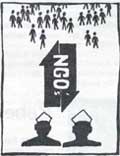Calling the third Sector
 I AM happy that a large number of leading non-governmental organisations (NGOs) are meeting for a consultation with key development ministries. I had addressed a gathering of NGOs in December, 1991, where I had offered to withdraw the government from certain areas altogether, provided the NGOs take over the responsibility of implementing all development programmes in those places.
I AM happy that a large number of leading non-governmental organisations (NGOs) are meeting for a consultation with key development ministries. I had addressed a gathering of NGOs in December, 1991, where I had offered to withdraw the government from certain areas altogether, provided the NGOs take over the responsibility of implementing all development programmes in those places.
Our goal of uplifting the poor can be achieved only if the government and the NGOs work together, despite the differences in our work and style. I don't see any difficulty provided we understand how to harmonise our respective roles. What is clear to me is that the early eradication of poverty is not possible unless all the resources available to us -- human, material and organisational -- are mobilised and efficiently directed to areas and programmes which need them most.
We have to remember that the people must occupy the centrestage. They should be the focus of all that we aim to do. Therefore, when I talk of a participatory approach to development, what I have in mind is an approach where the people would be helped to help themselves. Therefore, if a particular area is taken up by a NGO, a time should come when the people are fully mobilised and empowered to deal with their own problems. In other words, the NGO should withdraw after the task is done.
As far as the government is concerned, the concept of withdrawal is equally important. The formulation of polices, initiating programmes and schemes consistent with such policies and the provision of adequate resources for the programmes -- all this is the legitimate duty of the government. However, the flexibility required to take initiatives is sometimes lacking. This quite often defeats the very purpose of the programmes designed for the people.
Agents of delivery
We are changing all this but we need the assistance of the NGOs in some areas. NGOs, being the agents of delivery, need not make things better for the people. What is important is to prepare the people, which is what the NGOs can do most effectively. It is this preparation which is going to be the most important aspect of the NGOs' programme. They are also better equipped to give the government feedback. So, a meaningful dialogue between the NGOs and the government is necessary before the state launches any programme. The central issue in all development is social mobilisation -- enabling and empowering the people to fully receive what is intended for them. The NGOs have a crucial part to play in this task.
We now have the Constitution (73rd Amendment) Act, 1992, under which we would have self-governing panchayats elected by the people. As many as 29 areas of development, including agriculture, watershed development, smallscale industries, rural housing, drinking water, primary health care, fuel and fodder, public distribution system and education would be in the hands of the panchayats. This is a revolutionary step that we have taken. Here, the NGOs have a crucial part as external catalysts.
Don't ask me what the NGOs have to do when the panchayats come. Motivating the people, working among them, not getting into a clash with anyone -- that is the crux of the whole thing. The sarpanch, who has some power at the village level, should be able to appreciate the work of the NGO. Otherwise, he will say, "This is another parallel sarpanch coming and interfering with my work." I am warning all NGOs that this is going to happen more often in the villages. Please be clear as to where the panchayat's power ends and the persuasive power of NGOs begins so that the panchayat does not misunderstand NGOs as meddlers. Already, the panchayati raj institutions are likely to clash with the legislature. Seen in the local perspective, the sarpanch is more powerful in his own field than the Prime Minister of India.
The challenge before the NGOs, therefore, is clear. The question is how to take full advantage of the environment that the government has created through formulation of polices and schemes that are helpful to the poor, particularly the rural poor. They also have to take advantage of the decentralised institutions created at grassroot levels and work in harmony with them to empower the poor.
I am aware that we have a few thousand voluntary organisations in our country. At the same time, I am also aware that the spread of these is indeed limited. While commending the work being done by all these organisations, I would like to take this opportunity to invite more and more people of goodwill to come forward to work in the rural areas.
Tomorrow, the nyaya panchayats are coming. Let me tell you that the panchayat is a very powerful body because it is a combination of the legislature and the executive and also the judiciary in the nyaya panchayats. Now, how are the NGOs going to interact with this very, very powerful body?
This is an extract from the Prime Minister's speech to the Conference on Collaborative Relationship between Voluntary Organisations and the Government, held in the Capital in March this year
Related Content
- Loss and damage and agrifood systems: addressing gaps and challenges
- Future of Consumption in Fast-Growth Consumer Markets: ASEAN
- Earlier phase-out of fossil-fuel cars in the UK welcomed
- The food loss reduction advantage: building sustainable food systems
- Corporate sourcing of renewable energy: market and industry trends
- Global Investment Competitiveness Report 2017/2018: foreign investor perspectives and policy implications
